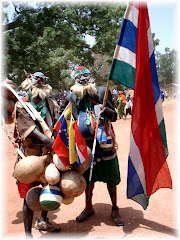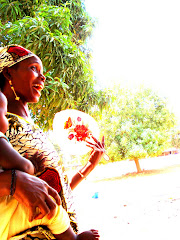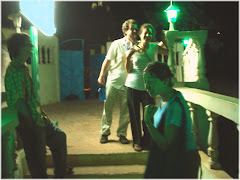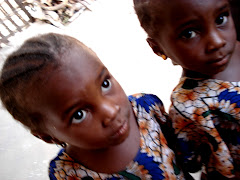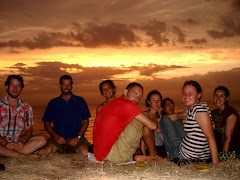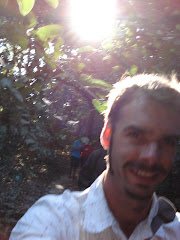I can’t believe that so much time has passed since I last wrote. I keep getting stalled, busy on projects. But I’m constantly thinking: I should update my life.
First, let me apologize that there are no photographs for you to look at. I spent several hours last week compiling snapshots from the past month but immediately afterward my laptop crashed. It still isn't fixed but I wanted to write something anyway. No pictures is worth the following one million words.
Today is the fourth day of a cramped belly, aching bones, desperate lunges to the toilet. I’m in the med unit taking doses of antibiotics for the dysentery I’
ve been suffering through. My body goes through cycles of shivering cold that makes my stomach cramp and my lungs seize followed by bouts of feverish sweating that causes drops of water to drip from my pale, pasty flesh. Sounds dramatic. Yesterday’s attempt to drink a glass of water resulted in projectile vomiting. I’
ve fouled my underwear more times than I care to recollect.
But I should say that I’m finally getting better. The
Ciprofoxacin is killing the bacteria that made their home in my gut. I haven’t eaten anything for days so there’s hardly anything in my stomach to give me trouble. But when you’re sick like that, days go by like months and I can hardly remember staggering into the med unit covered in sweat, my face hanging off my head. Tammy says that I’m hilarious in my delirious yammering.
Before this, I was living for a few days at the nicest hotel in The Gambia: The five star Sheraton on the coast across from
Ghanatown. We had our semi-annual All-Volunteer meeting where the Peace Corps
Administration told us all how valuable we are, what we should improve upon, and how the new budget from Washington still
doesn’t begin to cover our expenses. But going from grass mattresses to cloud-like pillows, bucket-baths to hot showers in glass enclosed bathrooms, the prickly heat of humid rainy-season Gambia to air-conditioned rooms with iced sodas will make anyone feel valued. Buffet dinners, pool-side beverages, ocean breezes.
I spent nearly the last two months on trek conducting the Feed the Minds sponsored “
Freebee” training. It was truly a rewarding experience and I enjoyed the
opportunities to work with beekeepers all over The Gambia. Many of the people we contacted were
inexperienced but interested in learning about beekeeping. Others though had a lot to teach me. It gave me the chance to harvest from grass hives, log hives, and hives made from broken pounding bowls. I got to observe the difference in honey production from different regions here. Some places are densely forested with silk cottons and cashews while others are open
savanna with a few baobab trees. Some colonies were old and some brand new.
I travelled with three of my Gambian
counterparts-
Karamu,
Kaddy, and
Gibril- and my very capable
Bambara driver
Abdoulie (who I once watched melt a broken car battery terminal over an open fire and then pour it into a mud mold to repair the one that had broken in our truck). We returned to all the villages we went to last autumn to see what people had been up to. On the first trek we had taught people how to weave grass hives and encouraged them to place them in areas where bee-fodder was available. This time we brought protective gear with us and took the
participants out into the bush to inspect the colonies and to harvest honey. Sometimes the
participants had built Kenyan Top-Bar hives (
KTBs) or grass hives that we could spend time around
demonstrating proper management techniques. For almost all of the people, this was the first time that they had really had the chance to inspect inside a hive. Even experienced honey hunters in The Gambia work in harried and quick-paced sessions with too much smoke on moonless nights due to their lack of protective gear.
We were able to take the time to show the difference between brood comb and honey comb, between capped and
un-ripened honey. We are trying to teach people that the quality of honey will affect the price they can set and that by taking only the best capped honey they can make more money. Honey-hunting in The Gambia is
traditionally done by men and older boys because of the associated dangers of wandering in the bush at night and the
accompanying stings of harvesting. But we were able to convince several women to come with us and wear the veiled garments and rubber boots. It was especially rewarding to see the women get the opportunity to work with us and several of them seemed quite inspired by the time we were finished.
For my own part, getting to work around so many different colonies was highly educational. At one site, nobody had had any luck attracting colonies but we wanted to have honey and wax for the second day when we would teach about processing. Someone mentioned some wild bees high up in a baobab tree a little ways from the village. That night we went to the bush and spotted the colony about forty feet up in a tree that must have been over two-hundred years old. We decided that I should go up. We found a homemade ladder that was rickety and poorly constructed with too much space between the rungs and about ten feet too short. We threw a rope over a branch just above the hole where the colony resided. The ladder was tied to the rope and lifted until it almost reached the colony. I was placed on a man’s shoulders and lifted up to the ladder that was spinning and dangling from the rope. Of course being enshrouded in my
beesuit, gloves, and rubber boots made me even more awkward than I would normally be clinging to a swaying ladder in the dark with angry bees circling me, sweat blinding me, and fear pounding through my veins.
From the man’s shoulders I reached high and grabbed the bottom rung of the ladder and pulled myself up. The baobab was all I could see because of the hooded veil. I hung there for a moment gathering strength and then slowly pulled myself up. Once I stood on the bottom rung I breathed deeply to try to calm down. I was scared of falling. There were at least twenty people gathered around below, the colony was still so far above me, and my heart was pounding out of my chest. I reached up to the next rung and pulled myself up. And again. The wind was blowing and my own movements were causing the ladder to swim around; banging into the tree and then thrusting away into the dark. Flashlights bounced around like
klieg lights and a
bon fire gave the forest a weird glow. I pulled myself up to the next level and then the next. My arms were weak and shaking, the rubber gloves filled with sweat, the ladder to and fro. Finally I reached the top rung but realized that it was too low. I’d have to stand on it and wrap my arm around the rope that I was dangling from to reach the hive. I pulled on the other rope which brought my bucket and smoker up to me. The bees were aggressive; the hive at eye level was huge and probably had never been harvested. It was quite a trick to keep one hand wrapped around the rope while I used the other to pump smoke into the hive. The bees smeared on my veil and the smoke in my eyes all but blotted out the night. For one brief moment I was able to look around at the night: Stars through the sparse limbs of the baobab, a sleight breeze, people below illuminated by the fire they’d built. My fear of falling subsided. I knew that this is what I had come here to do. I was doing something different; trying something that tested my physical and emotional strength. Though I had been stung a few times through my suit and could feel the burn, I felt strong and clear. I tried to cut comb away with my hive tool until I fumbled it and dropped it onto the head of one of the men below. Without it, I just grabbed at comb with my hand and lumped it into my bucket. Eventually I reached brood comb and stopped harvesting. I lowered the bucket down and then slowly brought myself back down the ladder. By the time my quivering body hit the ground, half the bucket of honey had been eaten.
On that trip I also did a few other things I had not yet done here. I harvested honey from wild bees who had built their hive in an abandoned termite mound. I inspected colonies hived in water jugs and baskets wrapped with rice bags. I learned bee-terminology in
Mandinka,
Serehule, and
Wolof. At a water pump in a
Fula village I found a small swarm that had probably lost their home in a nearby bush fire. They were clustered on the wet concrete at risk of being
drownded and were remarkably docile- a result of being engorged with honey for their escape and most likely exhausted. The people pumping water thought this
Tubob was insane as I reached my naked hand into the cluster of bees and gently moved them around until I found the queen. I lifted her and cupped her in my hand but she took flight. It took several minutes of frantic searching before I found her again floating in a bucket of water. I fished her out and
Karamu helped me clip her wings. We returned her to the cluster until later that night when we married that small colony with a larger one that we were re-housing from a pounding bowl in the village to a
KTB in the bush. I also finally ate some brood which is considered a delicacy that gives men their "strength." The raw brood straight from the comb is salty and too watery to be appetizing but I rather enjoyed the satisfying pop in the mouth of the cooked ones.
All in all, the “
Freebee” training should be considered a success because we contacted so many people in the rural areas and taught many aspects of beekeeping. Men, women, and children attended the trainings and some seemed genuinely interested in getting involved. A few months ago, I wondered if we would even get the chance to work on the project because of budgetary and
administration problems. And we finished just before the first rains fell in The Gambia.
Aside from that, I’
ve been working on getting to know my new community. It
hasn’t been easy since I’
ve been away so much.
Gunjur is pleasantly large and I am able to maintain a certain anonymity there that was impossible in my old village. For some, Peace Corps is all about integrating into a community and developing a strong
relationship with their host family. For me, having come here as someone who
hasn’t really set-root in any particular place and who left home almost 20 years ago, the desire to bond has never really been there. I am more comfortable roaming. I enjoy that my new guardians treat me more like a renter than a family member. Sometimes, if I were away from my old village for too long I would have to give small gifts and
explanations to many people who wanted to know where I had been and why I was away so long. Now, I don’t feel so guilty if my work keeps me in
Kombo or on the move elsewhere in The Gambia.
It’s not that I don’t miss being in
Chewel because sometimes I do. The pace there was nice, the environment great for running in the bush or cycling, and I miss my friends there. It’s farming season and I remember fondly last year’s tiring days hunched under the sun weeding fields of rice, millet, and groundnut. I wonder whatever became of my
biochar pit. And sadly, because of the All-Vol, I had to miss the wedding of Landing and
Fatou, both dear friends who had taken good care of me while I lived in
Manneh Kunda. My new home is more like an apartment and the back yard is a concrete slab. I'm away from home too often to even think about planting a garden and I have yet to find a place to put my compost pit.
But there is still plenty of work to keep me busy. The remainder of my service will be spent mostly on beekeeping related projects and helping with the Training for the group of Volunteers that will replace my cohort. They arrive in November. Three of my fellow Volunteers and I are shooting
agroforestry training videos to be posted on YouTube and distributed to Peace Corps Volunteers. We've completed four of them thus far using the low-tech gadgetry available here. We've made videos about composting, garden bed preparation,
transplanting, and organic pesticides. I'm also the co-editor and tireless
contributing writer for our newsletter
Natanial Fatty's Miracle Almanac which keeps me busy coming up with joke horoscopes and fake interviews. I am writing a new manual for Gambian beekeeping based on what I’
ve been privileged to observe and experience here. I'm also working with some good folks who are trying to establish a non-profit venture here called
BeeCause which is a three-tiered initiative directed towards people living in poverty. I'm sure you'll read more about that as time goes on. Finally, Tammy and I are planning a backpacking trip to Cape Verde.
Personal failure: The Hundred Push-Up Challenge. A couple of months ago, a few friends and I found this website that guarantees that you can do 100 push-ups without stopping if you follow the six week plan. Twenty-eight of us signed up in our own informal challenge. Of course, the author of that program failed to consider what affect a protein-poor diet might have on the push-uppers. How much protein do you get from eating baby bees?
Every other day I pushed-up until I collapsed- almost bloodying my nose a few times. Some days I did as many as 175 push ups in half an hour. Not bad considering that in my initial test I
maxxed-out at 39 in a row. At the six week mark I did a progress test to see how close to 100 I could do.
Ceremoniously I dropped to the prayer mat spread on the floor of my new house. I started strong and wasn't even sweating when I passed number 39. At 45 though my ears started ringing. Number 47 found me leaving either a pool of sweat or tears on the mat below my face. I couldn't tell which because I was "in the zone." I collapsed at 49.
As far as I know, only one of my fellow
participants has actually completed the Hundred Push-Up Challenge. If I ever get my appetite back, I plan to try again.
My doctor just came into the room and told me that I am looking better but that she wants me to stay for at least a few more days to give my body a little rest. I told her that I really wanted to get back to work. She replied that the most important aspect of Peace Corps is the cultural exchange and that the work that we do here is a distant second. For me, learning about The Gambia has been an incredibly rewarding experience and having good
relationships with my
counterparts and friends here has made me feel like my service has been successful. It’s winding down. I’m thinking more and more about leaving and my Close of Service conference (also at the Sheraton thanks to off-season rates) is next month already. While I am fairly confident that I will push my leave date from December to April so I can complete a few things, I know that the end is coming. Having had the rural village experience for most of my time here and now a more urban one, I feel like I am getting to know this place fairly well. And with so much traveling, I now have a fairly broad perspective about The Gambia’s culture and environment. She’s right; the cultural exchange is certainly the most enduring aspect of Peace Corps service.



















 I'm going to move- tomorrow in fact- to a beachside village near the metropolitan capitol city of Banjul. I've been thinking about this move for six months and have finally decided that it is time to make the change. I have been working with the National Beekeepers Association of The Gambia on several projects and have also been participating in Peace Corps trainings. All of this has kept me away from the village where I have been living for the past sixteen months. Sometimes I enjoy it while at other times I am frustrated because I am unable to focus on my projects there.
I'm going to move- tomorrow in fact- to a beachside village near the metropolitan capitol city of Banjul. I've been thinking about this move for six months and have finally decided that it is time to make the change. I have been working with the National Beekeepers Association of The Gambia on several projects and have also been participating in Peace Corps trainings. All of this has kept me away from the village where I have been living for the past sixteen months. Sometimes I enjoy it while at other times I am frustrated because I am unable to focus on my projects there.

 I want to work where beekeeping is the primary focus, where people already have a basic understanding of the art and want to develop more intensive practices. I want to work with NBAG and the Sifoe Beekeeping Kaafo on their missions to teach Gambians about beekeeping while conducting research about bees in West Africa. NBAG and Sifoe are both within bicycling distance of my new home. While both of these places have experienced problems in the past with their practice and management, they remain dedicated to making a difference in The Gambia. By working with them, I can benefit more Gambians (hopefully) than I can by staying focussed on the small-scale work that accompanies life in an isolated rural village.
I want to work where beekeeping is the primary focus, where people already have a basic understanding of the art and want to develop more intensive practices. I want to work with NBAG and the Sifoe Beekeeping Kaafo on their missions to teach Gambians about beekeeping while conducting research about bees in West Africa. NBAG and Sifoe are both within bicycling distance of my new home. While both of these places have experienced problems in the past with their practice and management, they remain dedicated to making a difference in The Gambia. By working with them, I can benefit more Gambians (hopefully) than I can by staying focussed on the small-scale work that accompanies life in an isolated rural village. Of course it is a complex decision. I have spoken extensively about it with some of my counterparts, the Peace Corps staff, my Language and Culture Facilitator, and many of my friends. Finally, it comes down to asking myself "Where will I be most happy?" I have finally decided. While I am sure to miss some things about Chewel and to suffer from the guilt of abandonment, I also will be able to visit those people from time to time and to share with them some of what I will learn through my new, focussed work.
Of course it is a complex decision. I have spoken extensively about it with some of my counterparts, the Peace Corps staff, my Language and Culture Facilitator, and many of my friends. Finally, it comes down to asking myself "Where will I be most happy?" I have finally decided. While I am sure to miss some things about Chewel and to suffer from the guilt of abandonment, I also will be able to visit those people from time to time and to share with them some of what I will learn through my new, focussed work.















 It popped out and now I'm on the mend. Unless there was more than one that is...
It popped out and now I'm on the mend. Unless there was more than one that is... Ryan and Jeff and I were intrigued about this tropical place south of The Gambia called Sierra Leone so we left together on a two week trip. We had spoken with a few other Peace Corps Volunteers who had travelled there, checked a few websites, and looked through tattered copies of the Rough Guide and Lonely Planet. At the consulate in Banjul before we left, we were told to greet a few people. Then we were told to pay US$100 for the entry visa. The roundtrip tickets were US$300 from The Gambia to Freetown.
Ryan and Jeff and I were intrigued about this tropical place south of The Gambia called Sierra Leone so we left together on a two week trip. We had spoken with a few other Peace Corps Volunteers who had travelled there, checked a few websites, and looked through tattered copies of the Rough Guide and Lonely Planet. At the consulate in Banjul before we left, we were told to greet a few people. Then we were told to pay US$100 for the entry visa. The roundtrip tickets were US$300 from The Gambia to Freetown.



 I spent my downtime reading A Bend In The River by V.S. Naipaul. He wrote things like "...as I got deeper I thought: But this is madness. I am going in the wrong direction. There can't be a new life at the end of this."
I spent my downtime reading A Bend In The River by V.S. Naipaul. He wrote things like "...as I got deeper I thought: But this is madness. I am going in the wrong direction. There can't be a new life at the end of this."
 We also discovered a small hole-in-the-wall shop in Freetown called Barrack Obama Tea Shop which Ryan took a photograph of with Jeff proudly in front. We were immediately derided by the owner of the shop telling us that we had to pay him to take that photograph. He wanted to smash the camera and acted like he wanted to fight us. When we tried to rebutt that, since we had elcted Mr Obama, this man should pay us to use our President's name to sell over-priced cups of Nescafe he walked off in a huff complaining that we were selfish.
We also discovered a small hole-in-the-wall shop in Freetown called Barrack Obama Tea Shop which Ryan took a photograph of with Jeff proudly in front. We were immediately derided by the owner of the shop telling us that we had to pay him to take that photograph. He wanted to smash the camera and acted like he wanted to fight us. When we tried to rebutt that, since we had elcted Mr Obama, this man should pay us to use our President's name to sell over-priced cups of Nescafe he walked off in a huff complaining that we were selfish.



 No. 2 River Beach is a community-owned project on a beautiful beach of white sand with mountains rising practically right out of the Atlantic.
No. 2 River Beach is a community-owned project on a beautiful beach of white sand with mountains rising practically right out of the Atlantic.

 Ryan bought a bottle and we drank gin on No 2 Beach. Ryan ordered the baracuda skewers for Le30,000 and Jeff and I ate a plate of rice drenched in palm oil and wilted cassava leaves in a nearby village for Le1,000 each. We also were given roseheart fruits, bananas, and mangos.
Ryan bought a bottle and we drank gin on No 2 Beach. Ryan ordered the baracuda skewers for Le30,000 and Jeff and I ate a plate of rice drenched in palm oil and wilted cassava leaves in a nearby village for Le1,000 each. We also were given roseheart fruits, bananas, and mangos.



 Some help get the word out on the medical care that is available.
Some help get the word out on the medical care that is available.


 And maybe all the travelling was making us a little loopy.
And maybe all the travelling was making us a little loopy.









 The next morning we set out on a ten mile hike (to save the Le45,000 we would have spent on motorcycle rides) to the Moa River.
The next morning we set out on a ten mile hike (to save the Le45,000 we would have spent on motorcycle rides) to the Moa River. This was my first time ever in a closed canopy jungle and I was awestruck by the beauty of it all.
This was my first time ever in a closed canopy jungle and I was awestruck by the beauty of it all.



 You have to look up to see much more than the plants in your face.
You have to look up to see much more than the plants in your face.
 We walked with a guide from the community. He told us to keep looking up.
We walked with a guide from the community. He told us to keep looking up.

 Tiwai Island provides tents for the overnight adventure. We stayed two nights. Solar panels provide cold beer and lights at night. The staff is comprised of locals from nearby communities who are generous, informed, and friendly.
Tiwai Island provides tents for the overnight adventure. We stayed two nights. Solar panels provide cold beer and lights at night. The staff is comprised of locals from nearby communities who are generous, informed, and friendly.




 He asked what I was doing out wandering around. "Don't you know that today is Clean the Nation?" he asked. I said I didn't. He told me that it was against the law to leave your compound or hotel until 10:00 and it was only 9:15. "Do you agree with me that you have broken that law?" I noticed that his eyes were a bit glassy and he seemed to smell of palm wine. I guess that I had to agree that I had broken that law and so I said "Yes." He had me right where he wanted me. "So do you also agree that you are under arrest?" We debated that issue for a short time and then he instructed me to follow him to the police station. We started to stroll but he was in no hurry. He told me that he hadn't been paid in a long time and that it was a shame that even the public servants were poor in his country. Maybe if he had a friend from America... I started to catch on. Suddenly I saw Ryan walking towards us. Apparently he didn't know the law either and Officer Barri asked him if he agreed that he was under arrest. The three of us tarted to stroll towards the station when three other cops showed up and demanded identification from us. Ryan showed his passport and I showed my Peace Corps id because mine was in the hotel. They told us to come to the station for interrogation and to verify our status in their country. Officer Barri became defensive. Either he had grown to like us (after I had given him a fake American phone number and promised to let him stay at my house if he was ever in Europe) or was playing good-cop bad-cop. Either way, an argument between them took the heat off us. Eventually they all grew tired of the discussion and agreed that were no longer arrested.
He asked what I was doing out wandering around. "Don't you know that today is Clean the Nation?" he asked. I said I didn't. He told me that it was against the law to leave your compound or hotel until 10:00 and it was only 9:15. "Do you agree with me that you have broken that law?" I noticed that his eyes were a bit glassy and he seemed to smell of palm wine. I guess that I had to agree that I had broken that law and so I said "Yes." He had me right where he wanted me. "So do you also agree that you are under arrest?" We debated that issue for a short time and then he instructed me to follow him to the police station. We started to stroll but he was in no hurry. He told me that he hadn't been paid in a long time and that it was a shame that even the public servants were poor in his country. Maybe if he had a friend from America... I started to catch on. Suddenly I saw Ryan walking towards us. Apparently he didn't know the law either and Officer Barri asked him if he agreed that he was under arrest. The three of us tarted to stroll towards the station when three other cops showed up and demanded identification from us. Ryan showed his passport and I showed my Peace Corps id because mine was in the hotel. They told us to come to the station for interrogation and to verify our status in their country. Officer Barri became defensive. Either he had grown to like us (after I had given him a fake American phone number and promised to let him stay at my house if he was ever in Europe) or was playing good-cop bad-cop. Either way, an argument between them took the heat off us. Eventually they all grew tired of the discussion and agreed that were no longer arrested.





 I bought myself a big grass hat and a barracuda-bone necklace for my girlfriend in The Gambia.
I bought myself a big grass hat and a barracuda-bone necklace for my girlfriend in The Gambia. The next morning we went to the airport where we were informed that there was a US$40 "departure tax" that we would each have to pay before we could board the plane. I guess it was appropriate.
The next morning we went to the airport where we were informed that there was a US$40 "departure tax" that we would each have to pay before we could board the plane. I guess it was appropriate.
















